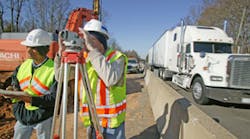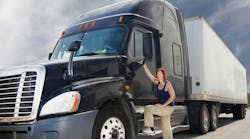The American Trucking Associations (ATA) is but the latest group to call on Congress to beef up highway funding, both to expand and repair existing infrastructure in order to improve the nation’s economic competitiveness in global markets.
“An efficient highway system is the key to a fluid global supply chain, which in turn is a fundamental element of a growing and prosperous economy,” said Tim Lynch, senior VP with ATA, in testimony before the U.S. House of Representatives’ Appropriations subcommittee on transportation, housing and urban development, and related agencies.
“(But) the U.S. has been living off the transportation infrastructure built by past generations,” he said. “Our failure to keep up with the demands imposed on these systems by population and economic growth has weakened the nation’s competitive position relative to other countries.”
Lynch said America’s aging infrastructure is in desperate need of repair and expansion, as congestion costs alone – caused by inefficiencies in the system – are rapidly approaching $100 billion annually.
“Eliminating bottlenecks on our highways and at our ports and border crossings will greatly enhance America’s competitive positioning,” he added. “But failing to address growing congestion problems will cause costs to rise, translating into higher consumer prices and slower job growth, weakening the U.S. ability to compete in the global economy.”
Even environmental groups admit that existing U.S. transportation infrastructure cannot handle the increase in freight volumes predicted over the next 10 years.
“By 2020, more than 90 million tons per day are expected to move throughout the U.S., a 70% increase from 2002,” noted the Environmental Defense Fund (EDF) in its recent report“The Good Haul: Freight Innovations for the 21st Century.”
“Our economy is expected to grow tremendously in the coming decades,” said Carrie Denning, an EDF researcher and one of the report’s authors. “This economy thrives on trade, and every one of us relies upon a robust freight system to get strawberries, the newest cell phone, and the latest sports shoes. We need an efficient and clean system to improve the timeliness of delivery, increase fuel savings, and help the environment.”
“We’ve really been falling behind in highway funding since the 1980s,” Greg Cohen, president and CEO of the American Highway Users Alliance (AHUA), told FleetOwner, noting that over the last three decades, highway capacity has only expanded by 4%, while vehicle traffic has nearly doubled.
“It’s a real shame we are taking our highways and mobility for granted in this country,” he said. “This isn’t just a trucking problem, either – it affects all motorists. Highway bottlenecks and traffic congestion affects everyone’s daily life.”
AATA’s Lynch added that America’s highway system connects all parts of the nation’s multimodal transportation logistics system including ocean and river ports and railroads, facilitating the movement of virtually all goods throughout the U.S. As a result, trucks to move 70% of U.S. freight tonnage today and are projected an even greater share in the future.
“Highways will continue to play a vital role in our nation’s supply chain,” he said. “However, the highway system no longer meets our nation’s demands.”
ATA supports increasing the fuel tax to fund necessary highway improvements, noting that trucking companies by and large are willing to support increased highway user fee payments, provided the revenue is dedicated to funding projects that address the most critical highway needs.
The trade group also believes a new federal-state partnership is necessary to promote truck size and weight reforms, to increase the capacity of commercial trucks without adding to their numbers, thus helping relieve traffic congestion and reducing exhaust pollution.




